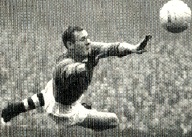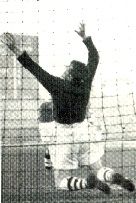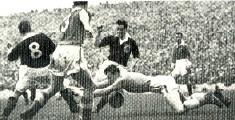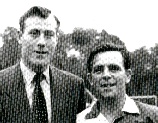
Jack Kelsey
Born Llansamlet, November 19, 1929; Died 1992.
Considering that Jack Kelsey was Arsenal’s goalkeeper for a decade it is surprising that his career should have brought so little in the way of honours. The Welshman was between the posts at a time of unusual mediocrity at Highbury but his performances ensured the club enjoyed real quality in one position at least. Kelsey’s excellence was such that it is possible to regard him as the clubs’ finest ever custodian.
Kelsey was recommended to Arsenal by their former player Len Morris. Kelsey was playing for Winch Wen in the Swansea & District league when he saved two penalties in a game against Morris’s team and on the ex-Gunners’ advice the strapping youngster was watched in a couple of trial matches.
Arsenal did not need long to recognise the potential of Jack Kelsey and within a couple of weeks of his virtuoso display for Winch Wen he had been signed on by the London giants.
It would be some time before Kelsey would establish himself in the Arsenal first team, however. At the time the Gunners were among the countries’ very best teams and had a highly dependable keeper in George Swindin. All Kelsey could do was learn his trade and bide his time.
An injury to Swindin gave Kelsey his first taste of senior football in February 1951 but it was an inauspicious start as lowly Charlton Athletic came to Highbury and won 5-2.
Kelsey ended the season with a handful of appearances but did not feature at all in the 1951-52 campaign as Swindin remained ever present in league and cup as the Gunners made it through to the FA Cup final only to lose in desperately unlucky fashion to Newcastle United.

The following season, however, saw Jack Kelsey emerge as a credible challenger to the veteran Swindin and by the end of it Kelsey had overtaken him as the clubs’ first choice. In all Kelsey played 25 times that season and ended up with a championship winners medal as Arsenal pipped Preston North End to the title on goal average.
Kelsey would develop into an outstanding goalkeeper over the next couple of seasons although the basic ingredients of his craft were evident from the start. He was big and strong but extremely agile. His positioning was sure and he was especially strong on crosses, commanding his area with real authority.
In the days of the battering ram centre forward Kelsey’s bravery was never in doubt and it was impossible to intimidate him from coming to claim a centre.
Arsenal had looked a good bet for the double in 1953 having reached the 6th round of the FA Cup and been drawn at home to Blackpool, only to then lose 2-1. The winning goal was scored by Allan Brown who suffered a broken leg as Jack Kelsey hurled himself into the challenge in a desperate bid to save.
It was a typical piece of bravery and one that he would repeat hundreds, perhaps thousands, of times throughout his career, often coming out worse himself. At no point was there any malice in Kelsey though, just an overwhelming desire to keep his goal intact.

The pity for Kelsey was that just as he was developing into a goalkeeper of the highest calibre the Arsenal team in front of him was beginning to wane and as the teams’ top players began to pass their best they were replaced by men of lesser ability.
The highest position the Gunners would manage in the league during the rest of Kelsey’s career was 3rd in 1958-59 and the goalkeeper would never take part in an FA Cup final either.
There were hugely disappointing 6th round exits at home to Birmingham City and West Bromwich Albion in 1956 and 57 and their other big opportunity disappeared in 1959 when Kelsey broke his arm in the opening minutes of their 5th round replay at Sheffield United.Kelsey, inevitably, continued as a makeshift left winger but the Gunners went down 3-0 with the stand in goalie Dennis Evans having a nightmare.
As Arsenal struggled to forge a side worthy of their illustrious past Kelsey became recognised as one of the true masters of his craft. His game was based on the security afforded him by his impeccable positioning and for the most part he made goalkeeping look easy.
The thrilling side of Jack Kelsey’s goalkeeping was always just below the surface, however, waiting to burst out when the situation demanded; the dramatic diving save, the headlong plunge at the strikers’ feet or the boldly confident claiming of a centre above the penalty area throng.
Like all sporting stars who genuinely touch greatness there was almost a beauty in the way Kelsey kept goal , a grace to match the raw power of his movements and a wonderful sense of timing about everything he did.
Kelsey did get to take part in European competition as well as the World Cup finals with Wales.
The Arsenal man was selected as the keeper for the combined London XI which took part in the inaugural Inter Cities Fairs Cup. This was a strange competition. UEFA decreed that only one team from any city could compete so London selected a team chosen from the sides of the capital. The competition also started in 1955 and ended in 1958.
Kelsey played both legs of the semi final victory over Lausanne and also in the final against Barcelona. Having drawn the first game the London team took a battering in Spain, losing 6-0.
While Jack Kelsey was a little unlucky to play in one of Arsenal’s more forgettable sides he was fortunate to be part of one of his countries’ best ever teams.
Wales could call on both the Charles and Allcburch brothers as well as Tottenham’s Cliff Jones and with the imposing presence of Kelsey in goal they made for competitive opposition. They were lucky to reach the World Cup finals in 1958, beating Israel in a play off after being drawn out of the hat as “lucky losers” from the European qualifying section, but made the most of their opportunity having got to Sweden.
Kelsey was outstanding as Wales drew all three of their group games against Hungary, Mexico and Sweden. Against the Swedes especially Kelsey was superb. With Wales playing for the draw that would take them to another play off fixture Kelsey’s goal was under almost constant pressure from the host nation but there was no way past the big keeper.
Once again it was the security of Jack Kelsey’s handling as much as his actual saves that drew attention.
Kelsey was again impressive as the Welsh managed to come from behind to defeat Hungary 2-1 in the play off, a brutal match, and then played another blinder in the quarter finals against the favourites Brazil.
Wales had to face Brazil without John Charles who had been savaged by the Hungarians and once again a massive burden fell on their defence and goalkeeper. Kelsey was again a massively reassuring presence as the underdogs held out for the best part of 70 minutes.
When Kelsey finally succumbed it was only to a combination of real inspiration and awful bad luck.
The Brazilians’ new prodigy Pele engineered space for himself deep inside the box with a spot of impudent ball juggling but his stabbed shot from point blank range might well have been saved by Kelsey but for a decisive deflection off Stuart Williams.
Jack Kelsey’s performances had earned the respect of football followers everywhere during this competition with the Brazilians dubbing him “the cat with the magnetic claws”.
Typically generous and modest himself Kelsey explained his form had been down to the chewing gum he always rubbed into his palms before games and went on to offer some reciprocal praise to the youngster who had beaten him.
“I think this kid has got a good future,” Kelsey opined about Pele.
Kelsey had made his international debut for Wales in March 1954 and only missed three internationals in the next eight years, despite regularly finding himself in the wars through his unflinching bravery in guarding his net with Arsenal.

It was while playing for Wales, however, that Jack Kelsey sustained the injury that would bring about his premature retirement from the game. On a South American tour in the summer of 1962 Kelsey plunged once more at the feet of an opposing forward, Brazil’s Vava, and sustained an injury to his back.
Although, with substitutes unusually available on this occasion, Kelsey left the pitch it hardly seemed something that would keep him out of the game for good but the problem would not clear and after several operations the big man was finally forced to call it a day in February 1963.
This was a sad loss for Arsenal, especially manager Billy Wright who had just taken over when Kelsey sustained the injury, and for football in general. Not only was Jack Kelsey an outstanding player but he was a true gentleman and sportsman.
Of course Kelsey had spent a decade in the Arsenal first team but it was possible, as a goalkeeper, that his best days were still ahead of him when injury struck. There were certainly several seasons’ of top class goalkeeping left in him at any rate.
Arsenal recognised his qualities as a man as well as recognising the sterling service he had given them on the field by appointing him in a secretary-promoter role for the clubs’ Improvement Society but it was also a shame that injury forced him out of the game at the time when the maximum wage had just been abolished, denying him the chance to gain a little more in the way of financial reward for his abilities.
As it was Jack Kelsey received £5,000 as insurance money for the injury and a further £7,000 from his testimonial game against Glasgow Rangers.
Although the passing of time and the fact that Kelsey played in one of Arsenal’s less feted sides mean his contribution is possibly somewhat overlooked there is no doubt that he remains right up there with the very best goalkeepers’ the club have ever possessed. Possibly, perhaps, the very best?
Jack Kelsey’s Career Statistics
CLUB GAMES GOALS
Arsenal FC 327 0
Wales 41 0
TOTAL 368 0
